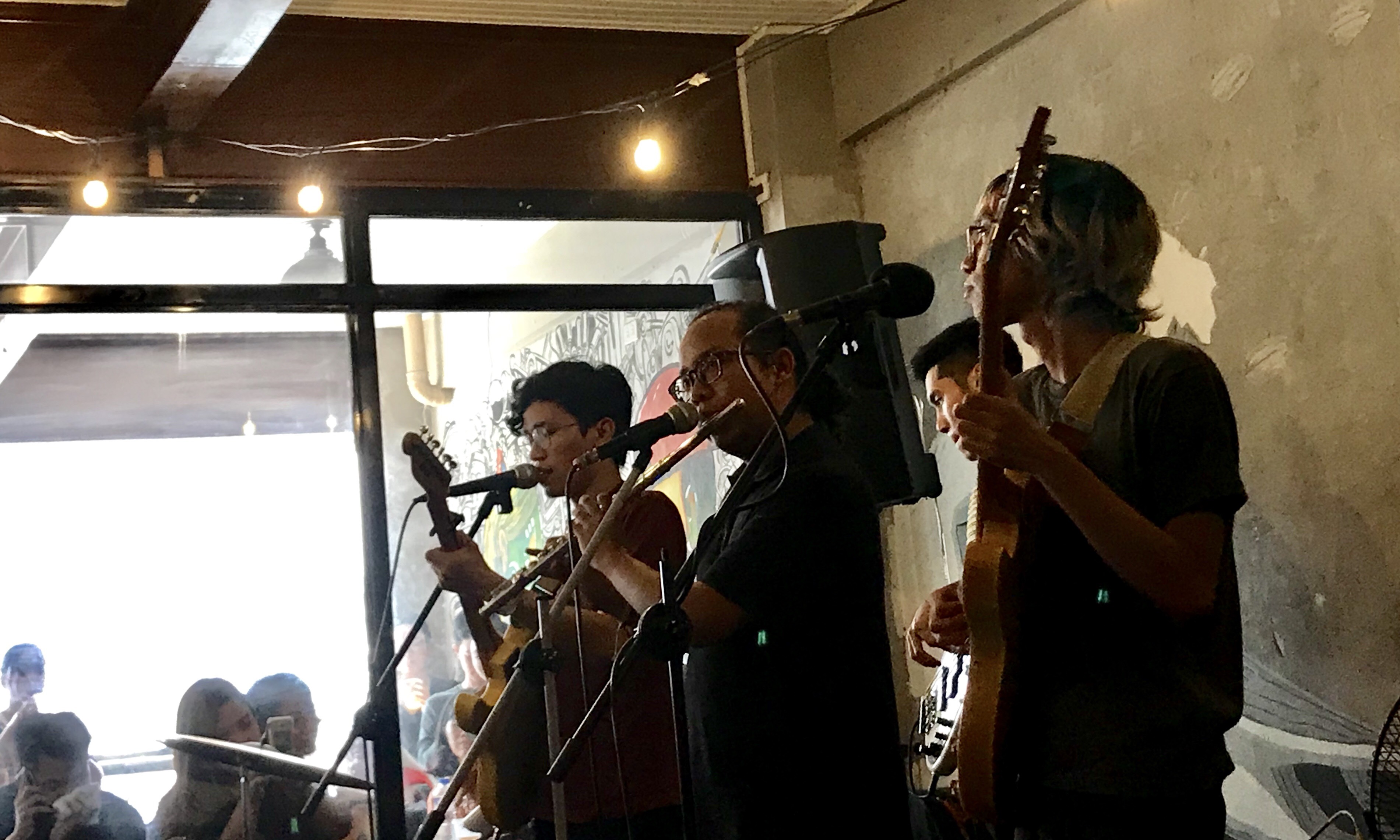Munimuni band shares stories behind songs about hope

(From left to right) Munimuni band members Owen, Jolo, TJ, Adj, and Josh share the stories behind some of their songs in an interview with INQUIRER.net. INQUIRER.net photo / Ryan Leagogo
MANILA, Philippines – If you’re into a calming, folk sound beautifully incorporated with deep, poetic lyrics of love and hope, local band Munimuni might just end up being your top choice in music streaming platforms.
Through songs classified under a new genre they popularized as “makata pop,” the band, composed of Millennials Adj Jiao (vocalist, guitarist), TJ de Ocampo (vocalist, guitarist), John Owen Castro (vocalist, flutist), Jolo Ferrer (bass guitarist), and Josiah Tumaliuan (drummer), will open your eyes to see a beam of light amidst life’s seemingly inescapable sorrows.
Original members of the band, Adj, TJ, and former Munimuni’s drummer Red Calayan, met in a Christian youth ministry at the University of the Philippines (UP) before starting the band in 2013. Years later, with Red exiting the group, other members who were also from the same youth organization joined Adj and TJ.
TJ shared how worship music influences the kind of sound and message entailed in their songs.
“’Yung sound ng Hillsong or church music in general, pati ‘yung mga hymnal, naiinfluence niya ‘yung sound namin, musically and lyrically, pati ‘yung theme na hope na laging pinag-uusapan sa church or sa Bible, it’s apparent, ‘yung influence niya,” TJ said in an interview with INQUIRER.net.
(The sound of the group Hillsong or church music in general, including hymns, influences our sound musically and lyrically. The influence of the theme about hope, which is always the topic in church and in the Bible, is also apparent in our music.)
TJ said the band did not intentionally decide on a unified theme for all their songs, but most of their releases automatically had this message because hope is “something that flows within” them as individuals.
“I guess relevant ‘yung message na ‘yun, ‘yung [that message is relevant, that] hope message for this generation,” TJ explained, adding that a lot of young adults and teenagers go through difficulties in life.
Adj had the same view, saying that the profound lyrics of their songs are fueled by their own experiences or those of other people around them.
“We believe in hope, so siguro [maybe] what else do you write about other than things you experience and you believe? Doon nanggagaling ‘yun [That’s where the lyrics come from],” Adj said.
So far, Munimuni’s songs are purely Filipino, but even this, said Adj, was not intentional. He said the songs they have released so far were picked to be part of their “Simula” extended play (EP) in 2017 and first full-length album “Kulayan Natin” last year since it is related to each other and form a unified story together. He revealed they have written some English songs but these have not been released.
Here are the stories behind some of Munimuni’s best songs that will lift up your spirit whenever it feels weary, as told by the composers themselves:
Tahanan
“Hanggang dito na lamang ang iyong mga luha (Your tears will end here).”
Composer: Owen
If you cried by just hearing the first line of this comforting song, Owen says to do so is perfectly fine.
“That’s nice, kasi di ba ‘yun din ‘yung goal niya [song], para mawala lahat ng luha. So kung meron pa sa loob, kailangan mo siya ilabas. So okay lang ‘yun, na kapag narinig mo ‘yung line na ‘yun iiyak ka kasi ibig sabihin malapit nang mawala,” Owen said.
(That’s nice, because that’s the goal of the song, to release all your tears. So if there are tears still left inside, you should let it out. Crying on that first line is okay because it means the tears will soon run out.)
Accompanied by gentle plucks on guitar strings and light beats, “Tahanan” is a song about someone assuring a person experiencing difficulties that he will stay no matter what life brings.
Owen wrote the song before he was diagnosed with bipolar II disorder.
“May phase sa buhay ko na sobrang lungkot ko, tapos may isang araw na sobrang saya ko, so sabi ko sulat tayo ng kanta, so nagsulat ako ng kanta, ‘yun basically, ganun siya nabuo,” he narrated.
(There was a phase in my life when I was feeling so sad, then there was a day when I was so happy, so I said I will write a song, so I wrote a song. That’s basically how the song was written.)
Pagsibol
“Ang pagsibol ng buhay ay paglalakbay hawak ang iyong kamay (The flourishing of life is to journey while holding your hand).”
Composer: Owen
Owen’s style of composing seems to be different, as he prefers to write songs that continue the story of the previous piece he penned.
He described “Pagsibol” as the “child” of two other songs: “Tahanan” and an unreleased song titled “Alpas.”
If “Tahanan” is about someone assuring a person that he will be with him amidst trials, and “Alpas” is about the latter slowly believing that there’s hope, “Pagsibol” tells of that same person who finally realizes that the only way for his life to flourish is to be with that someone who comforts him in “Tahanan,” according to Owen.
Marilag
“Ang mundo ay binabalot ng iyong pagbangong muli (The world is covered by your arising).”
Composers: Adj and TJ
“Marilag,” as emphasized by its bridge, is evidently a song about rising again, similar to how the sun rises everyday and sheds light after a long, cold night.
Adj said he and TJ wrote “Marilag” after a night at UP Fair years ago.
“Nag-overnight kami sa bahay nina TJ with a group of friends and tulog na silang lahat. Inabot kami ng umaga, so nakita namin ‘yung sunrise, and ‘yun ‘yung naging starting point. [We said,] ‘Tara sulat tayo ng kanta,’ and in a span of mga 30 minutes siguro, from wala pang masyadong kulay ‘yung horizon until sa naka-akyat na ‘yung araw, doon namin nasulat ‘yung kanta. So metaphor ‘yung sunrise for us ng hope,” he said.
(We had an overnight with a group of friends at TJ’s house. They were all asleep but the two of us were still up and we saw the sunrise. That was the starting point. [We said,] “Let’s write a song.” In a span of 30 minutes, when the horizon did not have much color yet until the sun rose, that’s when we wrote the song. Sunrise for us is a metaphor of hope.)

Munimuni performs “Marilag” in a gig in Quezon City. INQUIRER.net photo / Cathrine Gonzales
Sa Hindi Pag-alala
“Kakalimutan na kita. Siguraduhin mong hindi talaga pwedeng tayo (I will forget you now. Make sure we can’t be together).”
Composer: TJ
Some say this song hurts listeners, but for TJ, “Sa Hindi Pag-alala” is more than about heartbreak, as it also urges people to do something after experiencing that pain. He even described it as a “decision song.”
“Marami kasing love song na puro heartbreak heartbreak lang, pero parang iba ‘yung song na ‘yun I guess [There are a lot of love songs that are purely about heartbreak, but I guess that song is different]. As the writer of the song, I would say iba siya [it’s different] in the sense na it wants you to do something besides wallow in your suffering.”
Moving on can also be associated with hope, and perhaps this relatable theme was one of the factors why “Sa Hindi Pag-alala” is currently the most popular song of Munimuni on Spotify.
According to TJ, the song was written based on his personal experience when he participated in a student-exchange program in Japan in 2015.
“Basta sa UP ‘yun, may exchange program dun, sumali ako, tapos ayun maraming nangyaring ibang bagay [I joined an exchange program in UP, and then a lot of other things happened],” TJ laughingly recounted.
Kalachuchi
“Dahil sa init, bumabalik ang dugo (Because of the heat, blood returns).”
Composer: TJ
TJ traced the inspiration behind the song Kalachuchi during his days at UP. He was walking with a “special person” inside the university premises sometime in May years ago, talking about the latter’s problem, when that person saw Kalachuci flowers blossoming inside the UP grounds.
When he went home, he researched about that flower and found that it blossoms the most when the season was hottest.
“Ginawa ko siyang isang picture na kung paano namumukadkad ‘yung isang bagay or yung bulaklak na ‘yun kahit na mahirap ‘yung panahon or kahit na masyadong malakas ‘yung tirik ng araw. Ginawa ko siyang metaphor for a person who is experiencing something na mabigat pero through that experience mas may possibility na mas lalo siyang mamukadkad as a person,” said TJ.
(I made it a metaphor of how that flower still blossoms despite the harshest season. I made it a metaphor for a person who experiences a tough situation but through that experience will have the possibility of blossoming more.)
Kulayan Natin
“Kulayan natin ng awit o tula ang mga araw na makulimlim (Let us color cloudy days with songs or poems).”
Composer: Adj
Imagine a scene in a movie where the only colors present are black and white, with two people walking on a road and together “paint” the surroundings.
That was exactly what Adj was thinking of when he wrote “Kulayan Natin,” also the title of their 2019 album.
“’Yung magkasamang naglalakad sa parang movie scene na ‘yun, kinukulayan nila ‘yung mundo, so mas active siya na kind of love, in a way na nag-o-overflow, nag-uumapaw ‘yung pagmamahal niyo sa lipunan na ginagalawan niyo,” he said.
(Those two persons walking in that movie scene paint colors to the world. That’s a more active kind of love because it overflows to the society they are in.)

Adj (second from right) shares the inspiration behind the song “Kulayan Natin,” also the title of Munimuni’s first full-length album released last year. INQUIRER.net photo / Cathrine Gonzales
Simula
“Darating ang araw na kakalimutan din natin ang lahat (A day will come when we will forget all these).”
Composer: TJ
“Simula,” the first song in the “Kulayan Natin” album, was written when TJ was only 18 years old and his family was facing a problem.
Introduced by a cinematic sound from Owen’s flute, it speaks about the hope that we will one day laugh at the situations that currently bring us down.
“’Yun lang ‘yung nararamdaman ko that time, na these problems that we face as a household, as a family, one day pagtatawanan lang natin siya or kakalimutan,” said TJ. “’Yun ‘yung inspiration niya na ‘yung ganung klaseng attitude na naghohope ka na one day matatapos din ‘yung lahat, or kahit hindi matapos but there will be better days.”
(There will be a time when we will forget or laugh at these problems we face as a family. That’s the inspiration of the song, that attitude of hope that one day, everything will be gone, or even if it does not end, there will be better days.)
Banaag
“Ako ang banaag sa dulo ng lahat (I am the light at the end of it all).”
Composer: TJ
“Banaag” was created out of TJ’s curiosity on a thick Filipino dictionary he found in Adj’s apartment.
TJ was browsing the dictionary when he discovered the word “banaag,” which means a light flickering from afar.
“Naimagine ko na para akong pilgrim tapos ‘yung land na pinaglalakaran ko sobrang dilim, pero may isang maliit na ilaw doon na ‘yun lang ‘yung pinupuntahan ko,” he said.
(I imagine that I am a pilgrim and the land I am walking through is so dark, but there is a small light and that light alone will guide me where I am heading.)
“And then may sinasabi doon sa song na ‘yun na bawat kulay ng buhay mo ay sinag ko lamang na hinimay-himay. So parang sinasabi doon na kung anumang na-e-experience mo ngayon, kung anong kulay man ng mundo mo ngayon, wala namang kulay kung walang ilaw diba? Hindi mo makikita ‘yung kulay kung walang ilaw, so the very reason na nakikita mo ‘yung kulay na ‘yun, na-e-experience mo ‘yun is because may ilaw na buhay na you can expect sa life mo,” he also said.
(And then the song also says that every color in your life is just a piece of someone else’s light. It somehow says that whatever you are experiencing now, whatever the color of your world is, there is no color if there is no light, right? You cannot see the color if there is no light, so the very reason why you see those colors and why you experience those things is because there is a light in life that you can expect.)
Year 2019 was a year of breakthrough for Munimuni as it marked the release of their album and “Kulayan Natin” concert. TJ said they are thankful to have reached these milestones as a full-time band even though they are operating in a challenging industry.
As for their plans for 2020, Adj said they will write more songs and attend more gigs. They added they also look forward to releasing another album but are not sure about when it can be released.
Following the success of their concert, will Munimuni hold another one this year?
“We’ll see. Of course, that’s a good thing to look forward to,” said Adj.